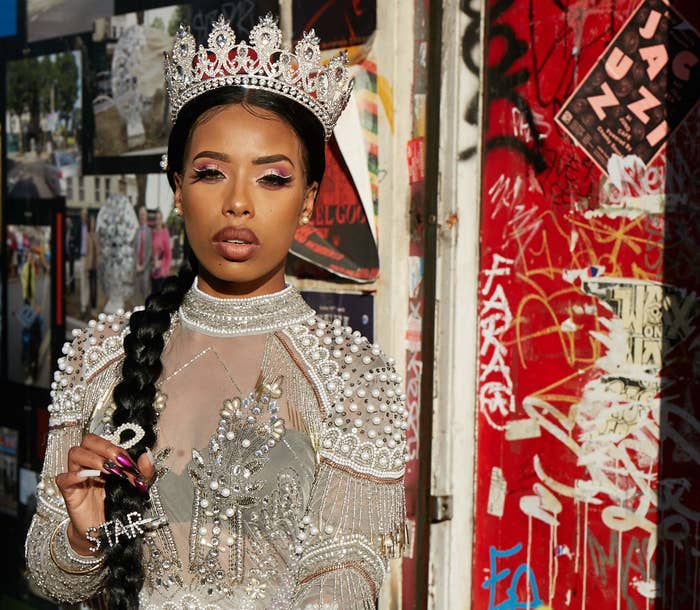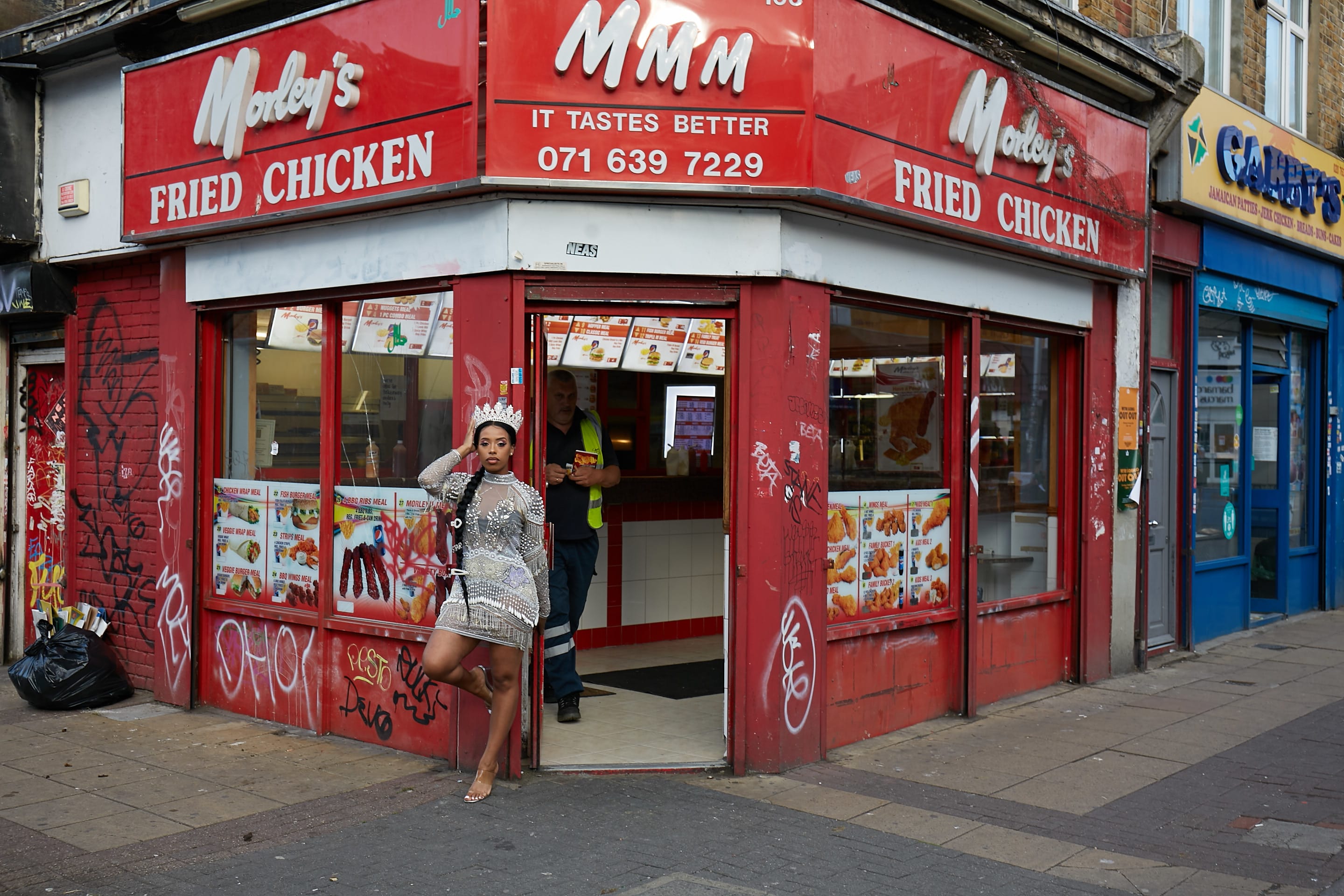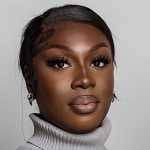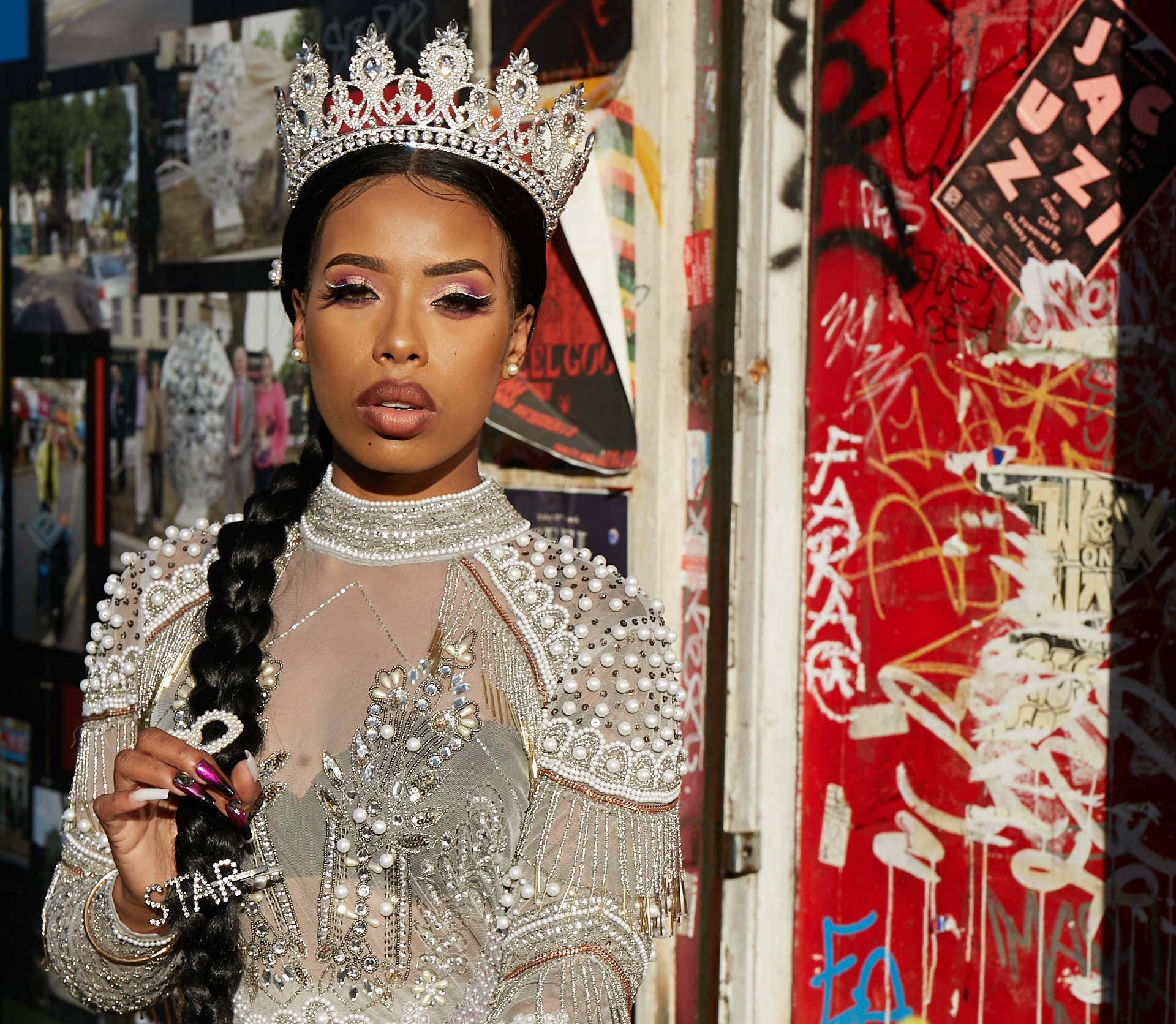
Fast-rising British rapper Trillary Banks is not one to be messed with. Armed with charismatic confidence and stupendous lyrical ability, the Leicester-born artist has curated an impressive range that merges the realms of road rap, dancehall, and UK drill.
Before she was known as Trillary Banks, dropping underground smashes like “Come Over Mi Yard”, “Pepper & Spice” and “White Hennessy”, she went under the moniker Pinky Go Getta and was a freestyle legend with ten years under her belt. Trillary continues to be driven within her craft, determined to make an impact as a female rapper in the UK and beyond. Beginning a new chapter in her career, she has just released The Dark Horse EP, which explores the idea of being respected by her peers whilst remaining underrated within the wider scene. Regardless if they take her in or not, Trillary Banks has reached a point of self-assurance that simply can’t be touched; she is very clear on what she brings to the table.
We connected with the rapper via Zoom to discuss her journey so far, holding her own in a male-dominated industry, the challenges of forging a career as an artist from the Midlands, as well as her dislike for people boxing her into one sound. Get to know.
“Whether I’m half-naked or fully clothed in a church frock, I should be able to be respected for who I am and the substance I bring to the table as a woman.”
COMPLEX: It must be a strange time to be releasing music during the COVID-19 pandemic, but a lot of us are grateful that artists—like yourself—are continuing to do so. How have you been coping mentally during lockdown, and how has it impacted your creativity?
Trillary Banks: Lockdown hasn’t really stopped anything for me. I feel like I’m growing so much and, musically, I’m the best that I’ve ever been. If anything, lockdown has given me a lot of time to sit and think and re-evaluate my life and where I want to go and how I can help people through my music. As mad as this year has been, it’s been very beneficial for me, in a sense that I feel like I’ve been able to evolve more, musically, and I feel like I’ve made some of my best music to date.
Women in rap are blowing up right now, on both sides of the pond. Do you think we’re reaching a new age in hip-hop?
Back in the ‘90s, you had Missy Elliott doing her thing and it was different to what Lil’ Kim was doing, it was different to what Queen Latifah was doing, it was different from what Trina was doing. We had options—everyone was doing their own thing—but now it’s like everyone’s saying the same thing but on different beats. We will get there, though.
What would you say is the most challenging thing about being a female rapper?
The fact that I have boobs and a vagina and a lot of the times I’m expected to show it and talk about it. As much as people want you to talk about that stuff, people can also use that against you, like it’s a super-bad thing. I feel like there are so many people who are just looking at you because of your beauty and your looks. That's what I think the biggest downfall is about being a female artist: you’re always expected to be half-naked to sell. A lot of men can be inappropriate, almost not knowing that I’m still a woman who is about her business. Whether I’m half-naked or fully clothed in a church frock, I should be able to be respected for who I am and the substance I bring to the table as a woman.
You previously mentioned that you have “no more Mr. Nice Guy energy.” Are you ready to take the crown now?
I am ready. I feel like the universe is aligning me for perfect opportunities now, and I feel like it’s all about timing. I’m at the point now, where it’s like: you listen to the rest, or you listen to the best. Does that make sense? I’m ready for it. I’m ready to take the crown and it’s not a competition and I want everyone to know it’s not a competition. I’m not competing with any of these other females. I wish them all well, but I feel like you know the right female has yet to be championed. I’m the one who will change the UK female rap scene.
I hear so many discussions about the music industry being London-centric. Being from Leicester, do you agree with this, and do you think there are any limitations for artists who aren’t from London?
I feel like there was, and I feel like anyone coming from outside of London is gonna have a little bit more of a hard time. But then you can have something that goes mad online, a viral moment, so it doesn’t really matter where you’re from. I came to London, found my feet in London, and I’ve been able to create a network and make a name for myself. The movements happening in Manchester and Birmingham, I feel like the gates are opening up a bit more. I didn’t see it as, “Oh, it’s hard for me. No one listens to me because I’m from Leicester.” No. I just set myself a task to get shit poppin’ and earn respect for being a female in music. And I feel like, to an extent, I have done that.
If you were from London, do you reckon things would be different?
One hundred percent! I feel like I would be bigger. Every female artist from London, they all have a background; if you’re from South London, you’re probably from the ends where there are rappers that people know, whether it be Peckham or Brixton; if you’re from East, you may be from Hackney; if you’re from North, you may be from Tottenham. We all know big artists from those places. Back in the day, if you weren’t from Leicester, you’re not really going to know the artists who are big from there because we never had the opportunities that others have had coming from London. We don’t have a music hub—no A&Rs, really, to my knowledge—and we don’t have any well-known journalists or bloggers that focus on the Leicester scene. But yeah, I’m from Leicester and I’m proud of where I’m from. I love where I’m from, where I grew up, and I love my friends. Being a young Black female in Leicester, it was dope. It was crazy, but it was great. I wouldn’t change it for the world because if I was supposed to be from London, I would have been.
“I’m going to be happy in ten years’ time, happy with what I’ve been able to do and contribute towards the scene.”

Tell me about your latest project, The Dark Horse. What was the process like in comparison to your previous ones?
For me, the process is always to let people know where I am in my life, at that specific moment in time. We had so many different names and vibes, but as “Drillary” and “Drillary 2” came about, me and my producer started focusing more on the rap side of things because I feel like, sometimes, people don’t appreciate me as an actual rapper. I really am a dark horse; a dark horse is someone who unexpectedly wins when all odds are stacked against them. I feel like I’m still very underrated, but I do appreciate the scene and the people who have supported me thus far.
Any personal favourite tracks?
Girl, I love every track on the EP for different reasons, so I don’t really have a favourite as such. I would say “Drillary 2”, “Sarah Jane”, “Keisha” and “Drip 4 Sale” are up there. “Drillary 2” just set the levels, lyrically. “Sarah Jane” was produced by Maschineman Tim and it’s honestly the dirtiest beat I’ve heard in our scene all year! Me and Stardom wrote that track during lockdown, and we totally bounced off each other. “Keisha” is, like, storytelling dancehall, which I don’t do much of. And I’m happy because I was able to bring a dancehall track to what I thought was gonna just be a rap-style project. “Drip 4 Sale” features Park Hill. He’s such a talented guy, artist, producer and engineer. He’s worked with some big names in the States, like Lil Durk and Future, and he’s really just dope. I’m a fan of his work.
In three words, how would you describe your musical style?
Authentic. Unapologetic. Unfuckwithable! So many people are stuck in a box, Mimi. They’re truly stuck in a box. In the UK, if you have a drill song that pops, you are now a drill artist and you have to do drill. If you’ve got a yard song that pops, it’s: “Ah, so she’s UK dancehall!” Why is it like that? Why can Drake do a dancehall song with Rihanna, a slow song by himself and a trap song with Future and still not be put in a box? You always rate him for the fact that he’s so diverse. Why can Nicki Minaj do a song with Calvin Harris, a song with Megan Thee Stallion and a song with, you know, Adele potentially, but no one will ever take away from Nicki? When Trillary does dancehall, drill and trap, then it’s: “She doesn’t know her lane. She’s confused.” UK people are so biased. We’re so negative towards ourselves, and we’re not going to prosper until we start to respect and uplift each other musically. I’ve got some solid international features coming and I am so excited for it.
Dancehall culture has been front and centre lately, with numerous battles via No Signal Radio plus the viral Verzuz between Beenie Man and Bounty Killer. How has dancehall influenced you and what does the culture mean to you?
Dancehall influences me in so many ways: from my hair to my nails to the way that I dance, the way I flow on songs, the vibe, the tempo. Growing up on dancehall and reggae, I just think there’s no music like it in the world. There’s something so pure about it. I view myself as a pure person and a raw person as well, so I’ve always been able to relate to dancehall. It always influences my music—even in my drill music, I still spit a bit of patois here and there. It’s just a big part of my life. It’s in my blood and in everything I do, even subconsciously.
I’ve noticed that you have a strong New York following, which makes sense as there’s a large West Indian community over there who appreciate dancehall culture in comparison to other states. That being said, would you ever collaborate with a New York rapper and, if so, who?
Jay–Z, Fivio Foreign, Nicki Minaj, Young M.A., Casanova, A Boogie Wit Da Hoodie. Yeah, I’ve got some fans in Brooklyn and the Bronx and, when I’m over there, they’re just like: “Oh my god! I can’t believe you’re here!” It’s always so much love and I know the New York girls are gonna vibe with me. I can’t wait to be out there and have even more of them know about me and my sound. What I’ve noticed is they’ve never really got onto a UK girl properly. I don’t feel like they’ve seen the right female yet to say, “Yo, she’s dope! Let me get in with her.” But the whole drill set-up in New York is dope. It’s just all timing, man.
Would you consider collaborating more? If so, which UK artists could you see yourself jumping in the booth with to lay down some heat?
I want to work with J Hus, MoStack, Meekz, Headie One, Tion Wayne, Dave and Stormzy, to name a few. A Potter Payper collab would definitely bang, too. There are some singers as well: Ed Sheehan, Adele, Mahalia, and maybe like Ms. Dynamite or Estelle.
Estelle doesn’t get enough love from the UK scene.
I need to do something like the “1980” track she did. I need to do something like that. When we were growing up, in the chicken shop, on the bus, badding people up, carnival and hot gyal hairstyles, that song epitomised that time for me. There are so many other dope UK females like Alesha Dixon and Jamelia, and she was from Birmingham! There’s a lot of people that I want to work with. Sade as well. Growing up, I didn’t even know she was from England [laughs].
Where is Trillary Banks in five to ten years’ time?
I’m going to have a few babies and I’m just gonna be sitting, looking back on my career and all these people I’ve met throughout my career. I’m going to be happy in ten years’ time, happy with what I’ve been able to do and contribute towards the scene, appreciating the grind fully and reminiscing on the awards that I’ve won and the opportunities that I have been given by God.

